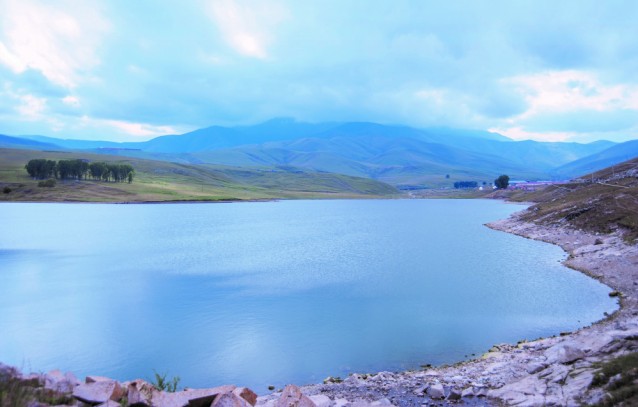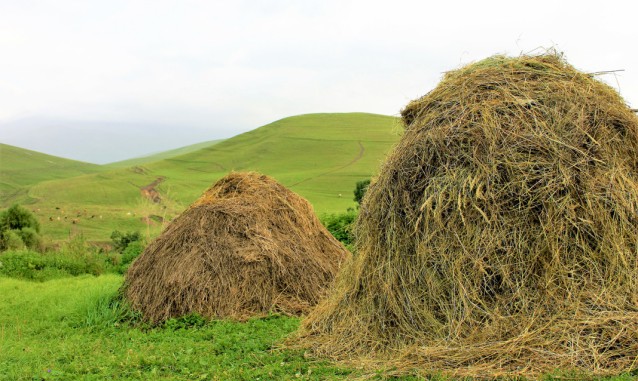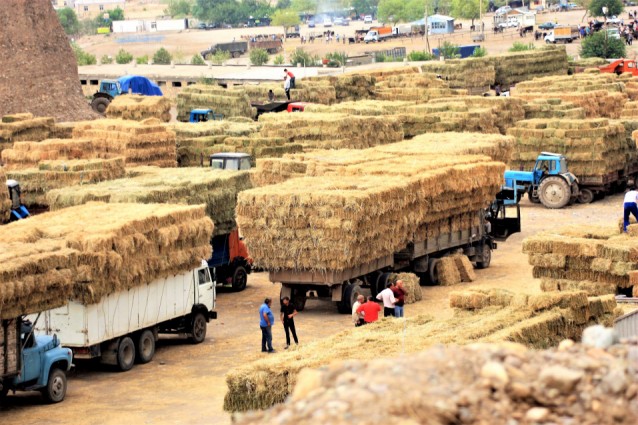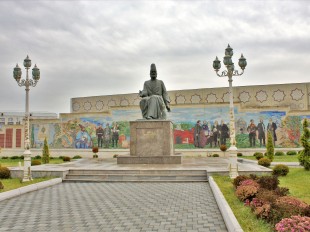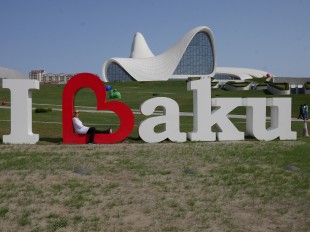Black faded to grey with hints of blue as a cool breeze stirred me awake. Outside, Khoshbulag, a quiet village in the Dashkesan region, lay in tranquil slumber. Shadows turned to shapes, and soon the semblance of a field was visible outside my window. Off in the distance, a rooster crowed, followed immediately by the barking of a dog. It seemed like this was the cue the village was waiting for. Within minutes, the air was filled with the sounds of life. Birds chirping, sheep bleating, cattle looing, an old Russian Lada struggling to turn its engine over, and shepherds opening their gates to drive their herds to the hilly grazing ground that rose above the houses in every direction.
I stepped outside to take it all in. Part of me wanted to follow them out and spend my day in the fresh air on the summit of a green mountain, but I knew we had other plans. Right now, it was the end of summer, and it was already time to start thinking about winter. The lush grass around me would disappear under the snow, and the animals would need something to eat.
I was staying at the home of an elderly gentleman named Jumshud Ibrahimov. His family had been raising cattle in this place for as long as he could remember. He had lived alone since his wife passed away, but his children and grandchildren look after him – as much as he lets them, that is. For a man in his 80s, he was full of spunk and wasn’t one to ask for help. He was already standing out in his yard and motioned to get my attention.
This is the house I was born in, he says, pointing to a stony pit overgrown with weeds. He walked over to one side and pointed, Right there. I was born there. Then we added this room for my grandmother. Shortly after that, his father went off to fight for the Soviets in the Second World War, never to return. Jumshud’s eyes moistened slightly as he paused over this memory. Then he turned, and we walked back over towards the house where I had spent the night. We built this later. I noted the cornerstone with the year 1965 carved into it. The simple stone and brick structure had two rooms and an entry way, each with a cracked wooden floor and a single bare lightbulb.
We went inside with his twenty-something grandson Rufat and had a simple breakfast of bread, butter, ağ pendir (white cheese, similar to feta) and sweetened black tea. As we were finishing up, Jumshud’s son Tahir arrived with several used plastic bottles full of spring water. Khoshbulag, which means “good spring,” has a reputation for quality water and pure, clean mountain air. Tahir handed me a bag with a wheel of homemade cheese and an old tomato paste jar filled with homemade butter. For your children, he smiled.
We then cleared the table and piled into the car to head to Ganja. This is the best time to buy hay, Rufat explained. The prices are always changing, sort of like dollars. You wait until the rate is right and then buy it up. On the drive out the day before, we had seen a truck laden with hay bales and had stopped to ask the driver how much they were selling for. At the time, it was three manats per bail.
We didn’t make it far before we had to stop. Tahir’s preteen son was leading a small bull up the hill to a truck waiting to take it to market. In the back of the truck, several cattle stood side by side with blankets wrapped around their eyes to keep them calm. Tahir, Rufat, and the truck driver then spent the next few minutes trying to coax the reluctant animal onto the truck, and then we were back on the road again.
We weaved along the narrow mountain highway, made a brief stop in the town of Dashkesan, and then came up to the agricultural bazaars on the south-western edge of Ganja. North of the highway, the land dropped sharply about ten metres, and a dirt road cut down to a large open area. Our first stop was at the feed bazaar.
Hunting for a deal
There, row upon row of Kamaz (Russian-made) trucks and tractors held thousands of bales of hay and dozens of one-ton plastic-wrapped balls of çuğundur (pronounced chooghoondoor), a type of feed made from the pulp of processed sugar beets. Tahir walked up to the back of a truck and grabbed a handful of loose çuğundur. He gave it a sniff and rubbed it around in his hand with his thumb to check the quality. I’m going to go over there and talk to the sellers and find out about the price. You can go look at the cows.
Rufat and I wandered off to let Tahir do his negotiating. The first part of the animal bazaar we came to was where they sold cattle, and off in the distance I could see another area for sheep and goats. The vast gravel expanse was dotted with sheds, corrals, and hitching posts where a variety of cattle were on display.
Whose animals are these? Rufat pointed to a tan cow with matching calf tied up next to a row of Soviet-era cars. A man sitting on an overturned bucket looked up, Those are mine.
He and Rufat then launched into a discussion about prices and the health of the animals. In the course of the conversation, they discovered that they were from neighbouring villages and knew some of the same people, at which point the prices dropped a little, but not as much as Rufat had hoped. After some more pleasantries, they said sağ olun (goodbye), and we walked further into the bazaar. Men in jeans and polos stood around arguing and gesturing wildly. A man in a black suit leaned against a hitching post and occasionally gave the cattle a whack with a stick when they would try to jump over the post to reach the food the animals on the other side were eating. A boy of about seven or eight leaned against his father and took in all the sights.
As we walked around and appraised the animals, Rufat explained that sometime soon they wanted to buy pregnant cows with yearling calves. They would keep them in Tahir’s family’s barn in Ganja for the winter be-cause Khoshbulag was too cold, and then move them out to pasture in the spring. The following fall, they would sell the calves and hopefully recover their costs for this year, with a little extra besides, and be able to add the mothers to their herd of dairy cows. There wasn’t much profit in buying and selling cattle, but they could make a living off of milk. If we get a young milk cow, she might live almost 20 years. We can get four to five litres a day of milk for a lot of that time at 80 qepiks a litre, plus making cheese and butter.
We stopped to look at a frail white cow who was laying in the hay and gazing intently at her calf. Her belly moved with signs of the life inside her. An older gentleman with black hair, a tan complexion, and ice blue eyes was leaning on a walking stick next to her. As we talked, it turned out that he was also from a village in the Dashkesan region and knew some of Rufat’s family. I don’t want to sell this cow to just anybody. He explained. She is older, so her price is lower, and there are some people who would just take her and butcher her even with the calf inside her. It is such a terrible sin. I want to know that she is going to a good person who will care for her.
Just then, Rufat’s phone rang. It was his uncle, saying he’d found hay for two manats a bale, and we needed to come help get it. We excused ourselves and made our way back across the bazaar. There, Tahir climbed up onto the Kamaz loaded down with balls of çuğundur and we jumped in the car to help lead the tractor-load of hay to Tahir’s barn.
Unloading and unwinding
When we arrived, Tahir’s daughter and her new-born baby girl were standing outside the adjacent house enjoying the weather. Rufat picked up his little niece and then Tahir’s daughter went inside to pre-pare tea for us and for the feed sellers. After unloading several one-ton balls of çuğundur, we all took our tea break, and then started in unloading a few hundred bales of hay.
It had been more than a decade since I left my family’s farm, and I’ll admit that office work had made my hands a little soft, but there was something about the smell of it all, the way the baling twine felt in my fingers, the sweat, the dirt, and even a little bit of blood from the sharp hay, that brought me back to my youth. Despite the thousands of miles of distance and the language and cultural differences, for a few minutes I felt like I was home again. I’ll confess I even found myself humming John Denver’s song, Thank God I’m a Country Boy.
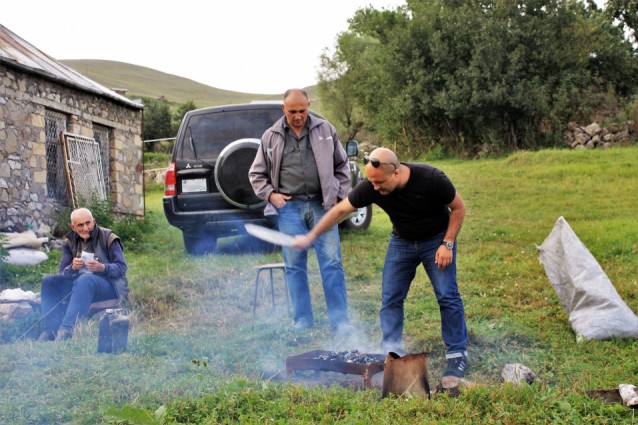 Rufat gets the coals ready for kebabs while Jumshud (left) and Tahir (centre) give him “helpful” feedback. Photo: David Maximovich
Rufat gets the coals ready for kebabs while Jumshud (left) and Tahir (centre) give him “helpful” feedback. Photo: David Maximovich
When all was said and done, and the feed sellers were paid and gone, we sat down to a meal of chicken, potatoes and cucumbers with a chaser of tea and candies. I saw the same look in their eyes I had seen so many times growing up. The tired satisfaction of knowing the day’s work was done and it was time to relax. The animals would eat well this winter, and there was enough for the coming new milk cows. This meant that Tahir’s family would have plenty of milk, butter and cheese to eat and to sell in the coming months. Next year, when they sold the calves, that might mean wallpaper for a bedroom, boards for a kitchen floor, or new clothes for their little girl.
This house was built entirely by money from animals, his son-in-law said. There was more building to do, but for now they could rest a little and enjoy each other’s company into the evening. Tomorrow, when the sun came up, the animals would wake, chores would need to be done, cows would need to be bought. The rhythm of day and night, summer and winter, work and family, fuelled by a river of tea, would go on.
